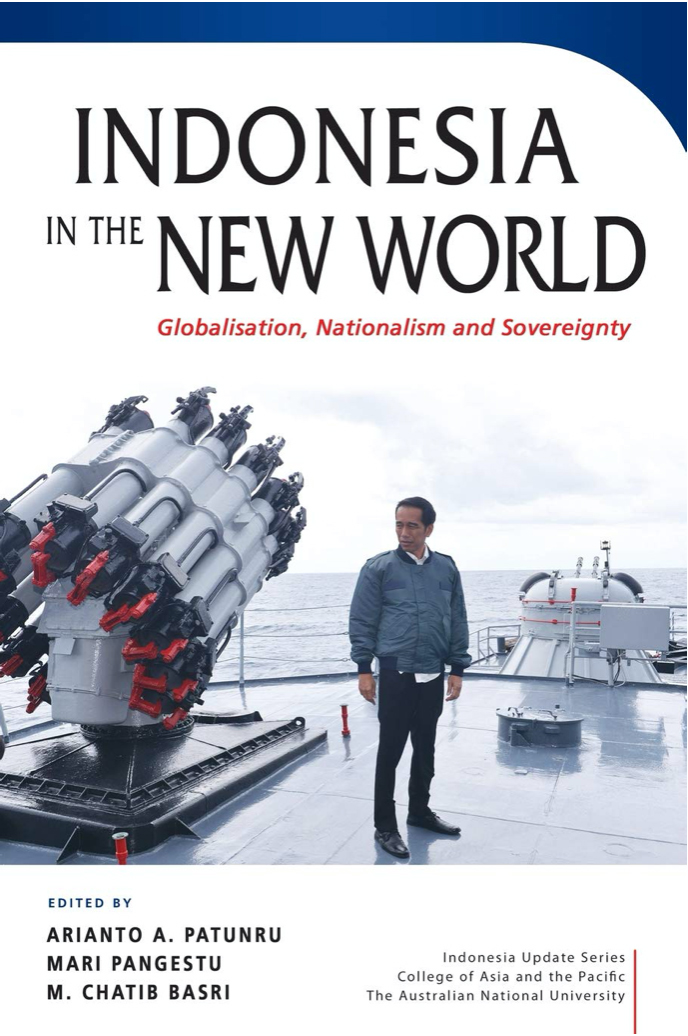[A. Patanru, M. Pangestu, M.C. Basri (eds), Indonesia in the New World: Globalisation, Nationalism and Sovereignty. ISEAS Yusof Ishak Institute. Singapore, 2018. 358 p.]
review / Irati Zozaya
 The book consists of fifteen articles, written by different experts, on how Indonesia has dealt with globalization and what effect it has had on the country. The texts have been coordinated by Arianto A. Patunru, Mari Pangestu and M. Chatib Basri, Indonesian academics with experience also in public management , having served as ministers in different governments. The articles combine general approaches with specific aspects, such as the consequences of the opening up to international trade and investment in the mining industry or the nationalization of foodstuffs.
The book consists of fifteen articles, written by different experts, on how Indonesia has dealt with globalization and what effect it has had on the country. The texts have been coordinated by Arianto A. Patunru, Mari Pangestu and M. Chatib Basri, Indonesian academics with experience also in public management , having served as ministers in different governments. The articles combine general approaches with specific aspects, such as the consequences of the opening up to international trade and investment in the mining industry or the nationalization of foodstuffs.
To explain Indonesia's current status , the book occasionally recapitulates periods of its history. Precisely one of the concepts that comes up frequently in the book is that of nationalism: it could be said, according to the authors, that this is what has most marked Indonesia's relationship with the world, regardless of who has led this country of 260 million inhabitants at any given time.
The first part of the book reference letter more generally to Indonesia's experience with globalization, nationalism and sovereignty. They begin by showing the colonial era and how, due to the imposition by Holland and Great Britain of an opening to the world, a strong nationalist sentiment begins to emerge. After the occupation by Japan during the Second World War, a total autarchy was implemented, thus leading the citizens to a problem that is still very present in Indonesia today: the internship of smuggling. In 1945 the country achieved its long-awaited independence under the presidency of Sukarno, who closed Indonesia to the rest of the world to focus on reaffirming national identity and developing its capabilities. This led to the deterioration of the Economics and the consequent hyperinflation, which ushered in a new era: the New Order.
In 1967, with Suharto's accession to the presidency, a cautious opening to foreign trade and investment flows began. However, Suharto repressed political activity and during his tenure the military gained much influence and the government retained control over Economics. In addition, the end of his presidency coincided with the Asian financial crisis (1997-1998), which led to a fall in the country's economic growth and a slowdown in poverty reduction, and consequently a growth in inequality. The financial crisis undermined confidence in the president and culminated in the collapse of the New Order.
The next period addressed is the Reformasi, an era that marked the beginning of a more open and democratic political climate. The next two presidents, Abdurrahman Wahid (1999-2001) and Megawati Soekarnoputri (2001-2004), were more concerned with economic recovery and democratic consolidation and a protectionist system regarding Economics endured. The book does not focus much on the next president, Yudhoyono (2004-2014), remarking only that he was an internationalist who maintained a more cautious and ambivalent stance on economic issues.
Finally, in the 2014 elections, Joko Widodo came to power and holds the position of president today. Under him, Indonesia has returned to the path of economic growth and has stabilized as a reasonably successful democracy. As the president, commonly known as Jokowi, has taken new steps to emphasize political sovereignty and promote economic autarky and national cultural revival, his term has been characterized as 'new nationalism'. In his political speech , Jokowi puts Indonesia as a goal of foreign conspiracies and calls to be on guard against such threats. However, the country maintains an ambivalent stance towards international openness and cooperation since, although trade restrictions have increased again in recent decades, Jokowi emphasizes global engagement and has reactivated regional negotiations.
All this has led to public dissatisfaction with globalization, with up to 40% of citizens believing that globalization threatens national unity. One of the most negative and important effects in Indonesia is that of workers who have been forced to migrate and work abroad under very poor conditions. However, the later parts of the book also show the positive consequences that globalization has had in Indonesia, manifesting itself in higher productivity, increased wages or economic growth, among others. The authors therefore emphasize the importance of constructing a narrative that can generate public and political support for the opening up of the country and counteract the growing anti-globalization sentiment.
As it happens in a book that is the sum of articles by different authors, its reading can be somewhat heavy due to a certain reiteration of contents. However, the variety of signatures also implies a plurality of approaches that undoubtedly provides a wealth of perspectives for the reader.